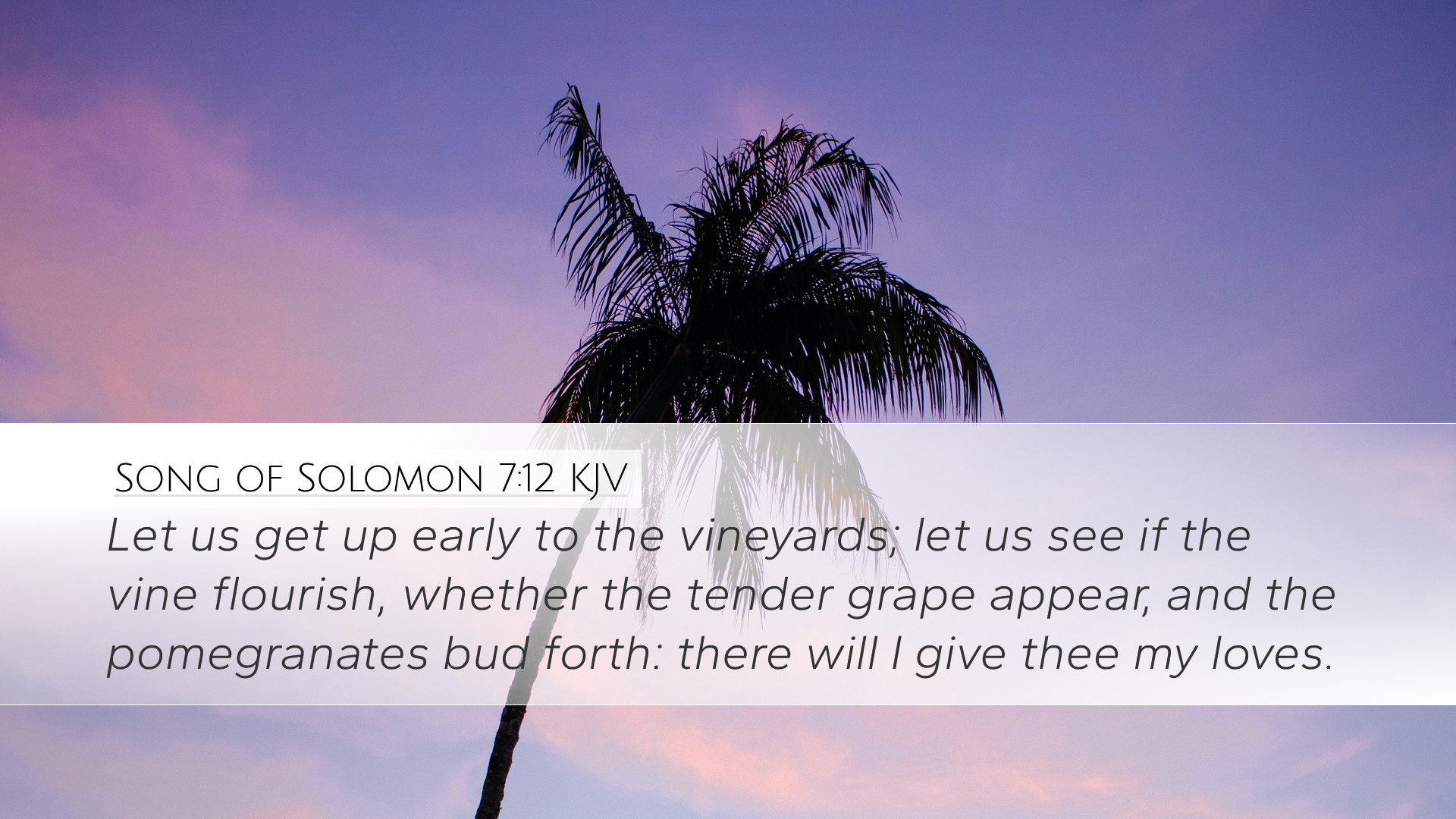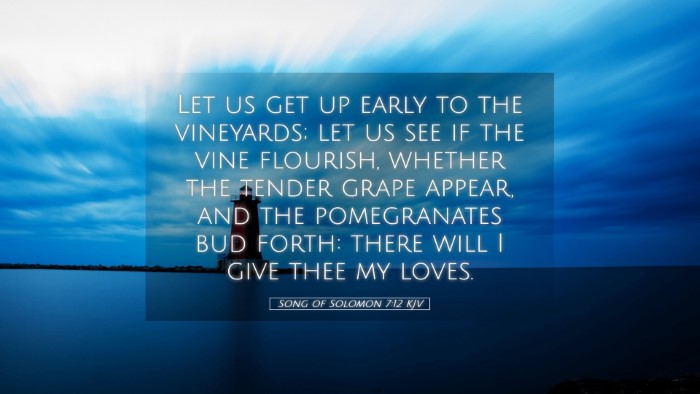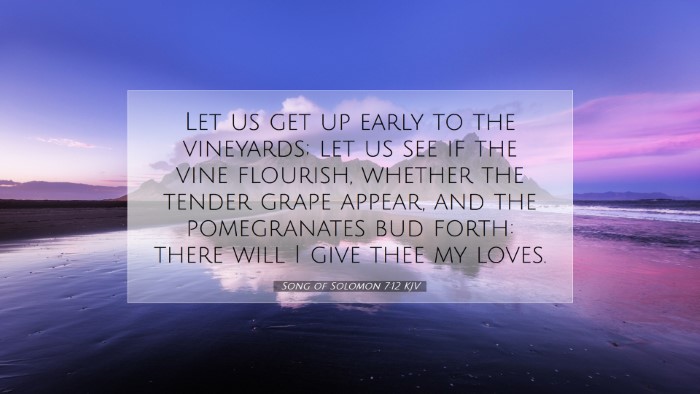Old Testament
Genesis Exodus Leviticus Numbers Deuteronomy Joshua Judges Ruth 1 Samuel 2 Samuel 1 Kings 2 Kings 1 Chronicles 2 Chronicles Ezra Nehemiah Esther Job Psalms Proverbs Ecclesiastes Song of Solomon Isaiah Jeremiah Lamentations Ezekiel Daniel Hosea Joel Amos Obadiah Jonah Micah Nahum Habakkuk Zephaniah Haggai Zechariah MalachiSong of Solomon 7:12
Song of Solomon 7:12 KJV
Let us get up early to the vineyards; let us see if the vine flourish, whether the tender grape appear, and the pomegranates bud forth: there will I give thee my loves.
Song of Solomon 7:12 Bible Commentary
Commentary on Song of Solomon 7:12
Verse: "Let us get up early to the vineyards; let us see if the vine flourish, whether the tender grape appear, and the pomegranates bud forth: there will I give thee my loves." (Song of Solomon 7:12, KJV)
Contextual Overview
The Song of Solomon, also known as the Song of Songs, is a unique book in the Bible characterized by its poetic form and exploration of romantic love. Written in a lyrical style, it presents a dialogue between a bride and her bridegroom, expressing themes of love, desire, and mutual admiration.
Exegesis of Song of Solomon 7:12
In this verse, the beloved invites their partner to rise early and explore the vineyards, symbolizing both the natural beauty of God’s creation and the flourishing relationship they seek to cultivate together. Early morning symbolizes freshness and a new beginning, setting a tone for exploration and intimacy.
Analysis of Key Phrases
- “Let us get up early to the vineyards”: This phrase suggests initiative and eagerness. It indicates a desire to engage in proactive exploration of love and intimacy, underlining the significance of taking the first step toward nurturing relationships.
- “Let us see if the vine flourish”: The vine is often metaphorical for spiritual growth and the vibrancy of love. Just as a vine flourishes with proper care, so too does love in a relationship. This serves as a reminder that love requires attention and nurturing.
- “Whether the tender grape appear”: This imagery evokes a sense of patience and anticipation. The tender grape represents the results of care and labor in a relationship, signifying fruitfulness that comes from time spent together.
- “And the pomegranates bud forth”: Pomegranates symbolize abundance and fertility. Their budding forth indicates the potential for new life and shared blessings within a relationship, reinforcing the idea that love brings forth fruitfulness.
- “There will I give thee my loves”: This concluding promise suggests a commitment to open sharing and vulnerability within the context of love. It emphasizes that love is an offering, a gift of oneself to another.
Theological Implications
This verse invites deeper reflection on the nature of love as ordained by God. It can be interpreted as both a literal and metaphorical call to cultivate intimacy, urging readers to actively participate in their relationships, much like tending a garden. When approached theologically, it speaks to God's relationship with humanity, indicating God’s desire for a deeply intimate connection.
Insights from Commentators
Matthew Henry
According to Matthew Henry, the Song of Solomon serves as an allegory of Christ’s love for the Church. He suggests that this particular verse highlights the blessedness and joy found in early communion with one’s beloved, pointing out the joy and beauty of seeking one's spouse and spending quality time together in God’s creation. He interprets the vineyards as representing the Church, flourishing where God's spirit abides.
Albert Barnes
Albert Barnes emphasizes the mutual invitation to explore life and relationships together. He comments on the significance of "early” in the context of setting priorities. He underlines the importance of seeking out spiritual and relational growth, noting that the vineyard metaphor encapsulates the idea of tending to one’s personal and communal relationships, urging individuals to actively seek what brings fruitful love.
Adam Clarke
Adam Clarke draws attention to the inherent romance and intimacy depicted in this verse. He interprets the vineyards as a metaphor for the heart and relationship, suggesting that just as one would observe the growth of grapes, similarly, a couple must observe the growth of their love and faithfulness. Clarke also connects the imagery of the vine and pomegranate to themes of fertility, representing both physical and spiritual union.
Practical Applications for Pastors, Students, and Theologians
This verse challenges pastors to teach the importance of nurturing relationships, not only within marriage but in all facets of life, including church communities. It serves as a reminder of the active role that believers must take in cultivating their environments for love and worship.
Students and theologians can reflect on the rich symbolism inherent in this verse, recognizing how it can serve as a study of God’s unyielding pursuit of humanity and the calls to intimacy we experience in our own lives.
Conclusion
In summary, Song of Solomon 7:12 encapsulates the essence of an active and flourishing love. The ideas presented in this verse extend beyond romantic love, serving as an invitation for all believers to reflect on their relationships, their spiritual growth, and the bountiful love God has for His creation. By engaging in and nurturing these relationships, believers can embody the abundant life intended for them.


